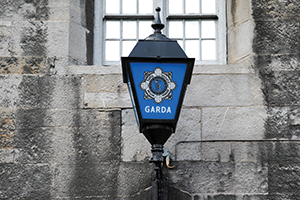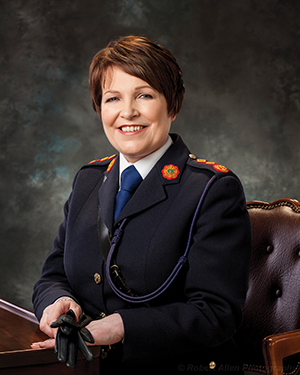Building trust through renewal

An Garda Síochána Commissioner, Nóirín O’Sullivan describes the renewal process currently underway in the service and the importance of ensuring public trust.
It has been a difficult decade for An Garda Síochána, hampered by public service cutbacks, it has been hit hard by a reduction in staff numbers and has been unable to carry out such much needed upgrading of both vehicles and technology. The service has also been subject of much scrutiny with 40 reports and 700 recommendations made about the service in the past ten years alone.
Having held the post of An Garda Síochána Commissioner for just over a year, Nóirín O’Sullivan, knows that every day brings a new demand and that for the Garda, like any other public service, renewal is necessary to ensure the continued delivery of excellent public service to every community and crime victim in Ireland.
Trust transformation
Shortly before O’Sullivan took up her post, the public’s trust in the service had fallen, according to one poll, to just 67 per cent. O’Sullivan believes that for any member of An Garda Síochána, public trust should be both their motive and their mandate. She is also a firm believer in the idea that no excuse, no matter how good, should be used as refuge from criticism and believes that in order to improve the public’s level of trust a transformation is needed.
“It has been clear for some time there is a need for renewing An Garda Síochána,” she says. “We need to establish a police service that reflects and meets the needs of a rapidly changing society, while retaining our community focus. We want to create a modern, professional organisation and harness a renewed culture that puts victims at its heart.
“We have to stretch from what was possible to what can be possible. As we have gone through the last number of years it would have been easier to use excuses but everyone in this organisation is dedicated to the cause and proudly displays that commitment and resilience that epitomises public service in Ireland.”
In the delivery of this transformation the Garda have consulted with three key partners, the community, its staff and the State. Having taken into consideration all that has been said O’Sullivan and her team have decided on two key principles that will be carried forward throughout the renewal process, these are:
• the changes that are made should be made without diluting all the good aspects of the service;
• ensure that changes are made while continuing to protect communities and the security of the State.
 These principles led to the creation of the Policing and Security with TRUST programme designed to ensure the Garda take care of its communities, renew its culture, unify its governance and leadership, support its people and ensure the entire service is technology enabled. The establishment of Victim Service Offices is a good example of how this strategy is leading to effective renewal.
These principles led to the creation of the Policing and Security with TRUST programme designed to ensure the Garda take care of its communities, renew its culture, unify its governance and leadership, support its people and ensure the entire service is technology enabled. The establishment of Victim Service Offices is a good example of how this strategy is leading to effective renewal.
28 Victim Service Officers have been established across the country to keep victims of crime informed as their case progresses through the criminal justice system. Feedback showed that many victims felt the support received from An Garda Síochána had previously been inconsistent with some going as far as to claim they felt An Garda Síochána had let them down when they needed the service the most. The Garda Protective Services Bureau has also been established to deal with cases of severe violence and child protection while a re-structuring of the Garda National Drugs and Organised Crime Bureau has, O’Sullivan claims, “re-energised” the Garda’s approach to tackling organised crime.
Similarly, on 2nd November, Operation Thor was launched to address burglaries during the long winter nights. This is a new multi-strand anti-crime strategy with five key aspects: crime prevention, crime investigation, victim support, education and awareness, and collaboration.
With statistics showing that 75 per cent of crime is carried out by 25 per cent of offenders, Operation Thor will actively target organised crime gangs and repeat offenders using a range of methods from high visibility checkpoints, the use of high powered vehicles by the armed Regional Response Units and additional patrolling in burglary hot spots.
Delivering reform
For O’Sullivan the most important thing about a change or transformation programme is that the transformation is actually carried through to completion. “The easy part is in the thinking and strategising, the hard point is in the doing,” O’Sullivan says. “If you don’t implement change, then the process will lose internal and external support, run out of steam, and eventually grind to a halt.
“To combat this potential threat to our programme, we established a dedicated office to co-ordinate the changes being made in different parts of the organisation, to make sure they are being delivered, and being done so correctly, consistently and on schedule.”
At a regional level An Garda Síochána has introduced Risk Compliance and Continuous Improvement Offices to ensure that its initiatives such as Victim Service Offices are being implemented in a standard way across the nation. The development of a transformation spine to make sure the Garda’s reform rollout is consistent right throughout the organisation is a crucial one. It is this spine that allows the Garda’s central office to measure and track the impact of the changes as they are made, and ensure that those responsible for its implementation are accountable for its delivery. This process will, O’Sullivan hopes, keep this massive change process on track.
The renewal process is, it would appear, is starting to having the desired impact. An Garda Síochána carries out a public attitude survey among 1,500 people every quarter. At present this survey suggests that the public trust in the organisation averages around 85 per cent. A remarkable improvement from April 2014’s figure of 67 per cent.
“The key to maintaining community support for renewal is to demonstrate the benefits of change, that’s what keeps the process alive,” O’Sullivan claims. “If this isn’t done properly, then people will quickly regard the changes as a quick-fix attempt to cover over the cracks, while the foundation continues to sink.
“It won’t be easy but I’m not afraid to aim high. I know the members, staff and reserves I lead are hungry for this change. Working together and with the support of all our partners, I know we can transform An Garda Síochána into a beacon of 21st Century policing.”

